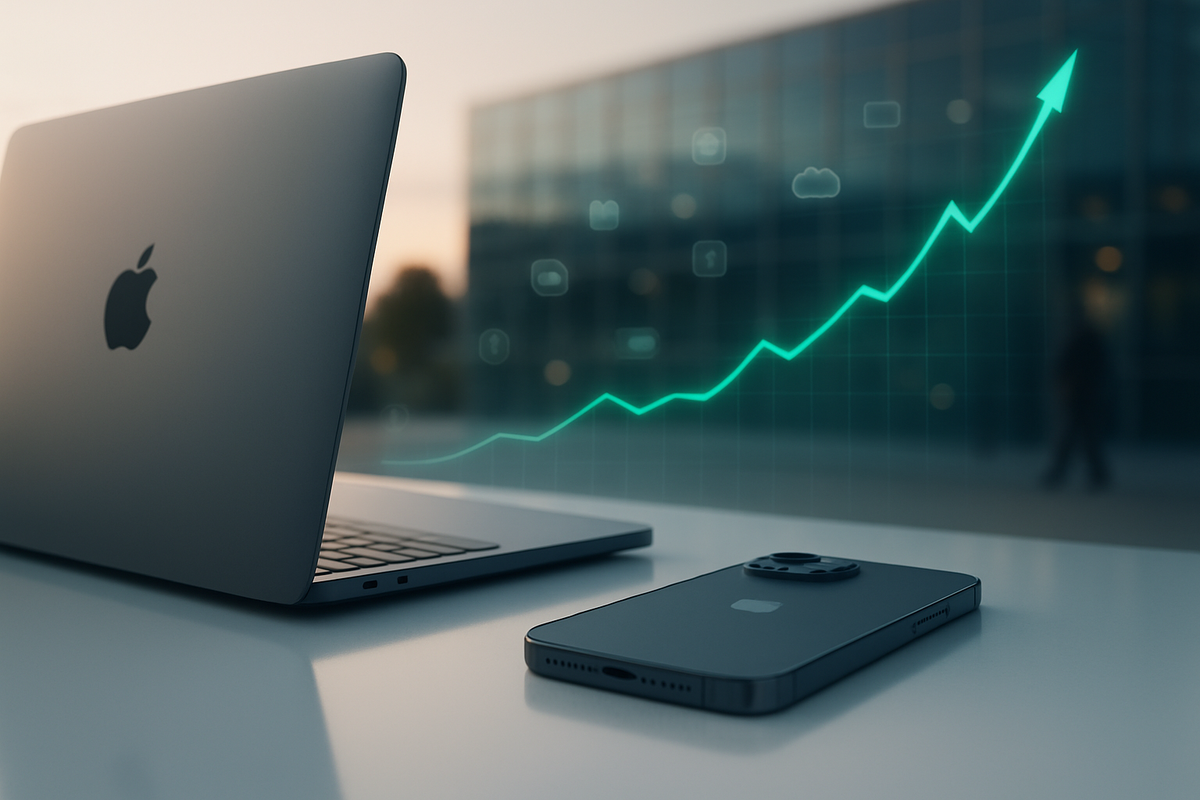Apple's Historic Q3 2025: iPhone, Mac, and Services Propel Tech Giant to New Heights

Cupertino, CA – Apple (NASDAQ: AAPL) has once again demonstrated its formidable market power, announcing a record-breaking third fiscal quarter for 2025. The tech behemoth reported an unprecedented $94.0 billion in June quarter revenue, marking a substantial 10% year-over-year increase, fueled by robust performances across its iPhone, Mac, and Services divisions. This landmark quarter not only shattered analyst expectations but also saw the Services segment achieve an all-time revenue high, further solidifying Apple's strategic shift towards recurring revenue streams.
The stellar financial results underscore Apple's resilience and innovative capacity in a dynamic global market. Beyond the impressive numbers, the quarter's narrative was significantly shaped by the strategic spotlight on "Apple Intelligence," signaling the company's aggressive pivot into the artificial intelligence arena. This proactive embrace of AI, coupled with the enduring appeal of its core product lines, sets a compelling precedent for Apple's trajectory and its broader influence on the technology landscape.
Record Performance and Strategic AI Push Define Apple's Quarter
Apple's Q3 2025 financial disclosures reveal a company firing on multiple cylinders, with several key segments driving its record-setting performance. The company posted a net quarterly profit of $23.4 billion, or $1.57 per diluted share, a 12% increase from the prior year, with a healthy gross margin of 46.5%.
The iPhone segment emerged as a particularly strong catalyst, generating $44.6 billion in revenue—a 13% year-over-year surge—and establishing a new June quarter record. This remarkable growth was attributed to the overwhelming demand for the iPhone 16 family and an unprecedented number of customers upgrading their devices. In a significant milestone, Apple also announced the shipment of its 3 billionth iPhone since its groundbreaking debut in 2007. The Mac division experienced an impressive resurgence, with revenue climbing 15% year-over-year to $8.0 billion, largely propelled by strong consumer interest in the new M4 MacBook Air models.
However, the Services segment truly shone, achieving an all-time record revenue of $27.4 billion. This 13% increase from the previous year means Services now accounts for a substantial 29% of Apple's total revenue, highlighting the success of its ecosystem expansion through platforms like the App Store and various cloud services. On the product side, while iPhone and Mac soared, the iPad segment saw an 8.1% decline to $6.6 billion, and the Wearables, Home, and Accessories segment decreased by 8.6% to $7.4 billion.
A pivotal development discussed during the earnings call was Apple's deepening commitment to artificial intelligence. CEO Tim Cook emphasized the introduction of "Apple Intelligence" features at the recent Worldwide Developers Conference 2025 (WWDC25) as a transformative moment, describing AI as "one of the most profound technologies of our lifetime." The company has significantly ramped up its AI investments, reallocating internal resources and making seven AI-related acquisitions in 2025 alone. While a personalized, AI-powered version of Siri with Apple Intelligence features is slated for a 2026 release, Apple's aggressive push into AI is clearly a core strategic direction that is already positively impacting market sentiment.
The Shifting Sands: Winners and Losers in Apple's Wake
Apple's robust Q3 performance and its strategic foray into AI are set to create ripples across the technology sector, identifying clear winners and posing challenges for others.
Winners:
- Suppliers (e.g., Taiwan Semiconductor Manufacturing Company (NYSE: TSM), Foxconn (TWSE: 2317)): Companies in Apple's extensive supply chain are direct beneficiaries of increased iPhone and Mac sales. Taiwan Semiconductor Manufacturing Company (TSM), a primary chip manufacturer for Apple, will see enhanced demand for its advanced silicon. Similarly, Foxconn, Apple's key manufacturing partner, stands to gain from higher production volumes.
- Semiconductor Innovators (e.g., Qualcomm (NASDAQ: QCOM), NVIDIA (NASDAQ: NVDA)): Apple's aggressive AI push and continued advancements in its own silicon design (like the M4 chip) could benefit certain semiconductor companies. While Apple increasingly designs its own chips, it still relies on external expertise for modem technology (Qualcomm) and could potentially partner with or drive demand for advanced AI acceleration components, benefiting players like NVIDIA in the broader AI infrastructure.
- Developers and Content Creators: The record-breaking Services revenue, driven by the App Store and subscriptions, directly translates to increased opportunities for developers building applications and services within Apple's ecosystem. Content creators for Apple TV+, Apple Music, and other platforms also benefit from the expanding subscriber base.
Potential Challenges/Losers:
- Direct Competitors (e.g., Samsung (KRX: 005930), Alphabet (NASDAQ: GOOGL)): While Apple's success doesn't necessarily mean losses for competitors, its strong performance, especially in the premium smartphone market, intensifies competition for companies like Samsung and Alphabet (with its Pixel phones). The "Apple Intelligence" initiative could also put pressure on Alphabet's AI offerings and other Android-based AI features to keep pace.
- Other Wearables and Tablet Manufacturers: The decline in Apple's iPad and Wearables, Home, and Accessories segments, despite overall revenue growth, suggests a potential shift in consumer spending habits or increased competition in those specific categories. This could put pressure on other companies solely focused on these markets.
- AI Startups (potential for acquisition): While many AI startups are thriving, Apple's aggressive internal investment and acquisition strategy could mean fewer opportunities for independent growth or could lead to consolidation, as smaller players are acquired to bolster Apple's capabilities.
Industry Tectonic Shifts: AI Integration and Ecosystem Dominance
Apple's Q3 2025 results and its pronounced emphasis on "Apple Intelligence" are not merely financial headlines; they represent significant shifts in broader industry trends and hold substantial implications for competitors and partners alike.
This event underscores the accelerating integration of AI into core consumer devices and software. Apple's entry into the generative AI space, particularly with "Apple Intelligence," validates the technology's mainstream potential and will likely spur other tech giants like Samsung, Alphabet, and Microsoft (NASDAQ: MSFT) to redouble their efforts in AI research and deployment across their product portfolios. This intensifies the "AI arms race," potentially leading to a faster pace of innovation and new AI-powered features across the tech ecosystem.
The sustained double-digit growth in Apple's Services revenue further cements the industry-wide trend towards subscription-based models and the power of a deeply integrated ecosystem. Companies that can successfully lock users into their hardware and then offer a lucrative suite of software and services will command significant market power. This puts pressure on hardware-centric companies to develop more compelling service offerings or risk being commoditized. Apple's massive installed base of active devices, an all-time high, provides a powerful foundation for this services growth, creating a virtuous cycle where hardware sales drive services adoption, and robust services enhance hardware stickiness.
From a regulatory standpoint, Apple's increasing market dominance in both hardware and services, especially with new AI capabilities, could attract closer scrutiny. Antitrust concerns, particularly regarding its App Store policies and potential vertical integration advantages with AI, might resurface or intensify. Historically, dominant tech companies have faced regulatory challenges when their innovations appear to stifle competition. This could lead to policy implications aimed at ensuring fair competition in emerging AI markets and platform ecosystems.
The Road Ahead: Innovation, Competition, and Strategic Evolution
Looking ahead, Apple's strong Q3 2025 performance and its strategic direction set the stage for a period of intense innovation and competition. In the short term, the market will keenly watch the rollout of "Apple Intelligence" features, particularly the more personalized Siri expected in 2026. The success of these AI integrations will be crucial in differentiating Apple's products and maintaining its premium market position. Continued growth in the Services segment will also be critical, as it provides a stable, high-margin revenue stream less susceptible to hardware sales cycles.
Longer-term, Apple faces both immense opportunities and significant challenges. The company's deepened investment in AI presents a massive opportunity to redefine user interaction with technology, potentially leading to new product categories or enhancing existing ones in unforeseen ways. Strategic pivots may include further vertical integration of AI capabilities, reducing reliance on third-party AI models, and potentially expanding its data center infrastructure to support AI processing.
However, challenges loom. The competitive landscape in AI is fierce, with well-established players like Alphabet and Microsoft, alongside innovative startups, vying for market share. Apple must prove that its "Apple Intelligence" offers genuinely superior and secure user experiences. Economic headwinds, supply chain disruptions, and potential regulatory pressures remain ongoing concerns that could impact future growth. Market opportunities may emerge in new applications of AI for health, augmented reality, and personalized computing, where Apple's ecosystem and design prowess could give it an edge.
Conclusion: Apple's AI-Powered Future Takes Shape
Apple's record-breaking Q3 2025 financial results mark a pivotal moment for the company, affirming its robust market position and highlighting a clear strategic direction for the future. The impressive growth across iPhone, Mac, and particularly the Services segment, underscores the enduring strength of Apple's product ecosystem and its ability to consistently deliver innovation that resonates with consumers. The all-time high in Services revenue, now a significant portion of total revenue, reinforces the company's successful transition towards a more diversified and recurring income model.
The most significant takeaway from this quarter, however, is Apple's bold and unequivocal commitment to artificial intelligence through "Apple Intelligence." This strategic pivot is not merely an incremental upgrade but a foundational shift that promises to redefine the user experience across all Apple devices. As the company continues to pour resources into AI research and development, acquiring talent and technology, it is positioning itself to be a dominant force in the next era of computing.
Moving forward, investors should closely monitor the successful integration and adoption of "Apple Intelligence" features, particularly the public reception of the enhanced Siri in 2026. The continued expansion of the Services segment, the ability to navigate complex global supply chains and trade policies, and responses to competitive pressures in the AI space will all be crucial indicators of Apple's sustained success. This quarter signals that Apple is not just riding the current tech wave; it is actively shaping the future of personalized, intelligent technology.



